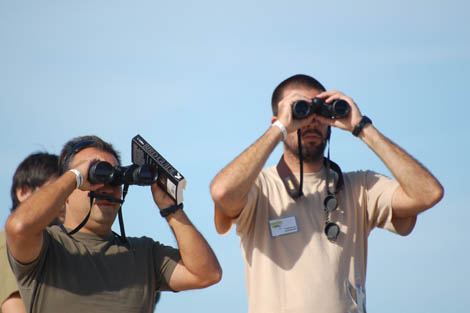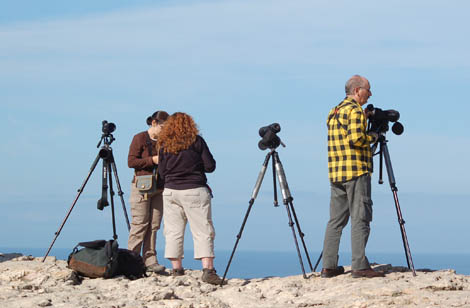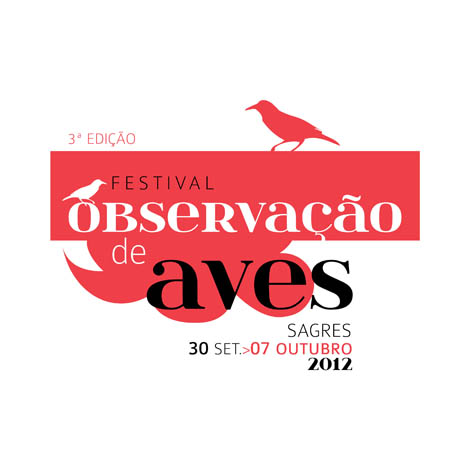 More days, more activities and greater coverage. In its third edition, the Sagres Bird Watching Festival started to grow again, after the first two editions proved to be a success.
More days, more activities and greater coverage. In its third edition, the Sagres Bird Watching Festival started to grow again, after the first two editions proved to be a success.
Between September 30th and October 7th, there are activities for all tastes for the general public and actions aimed at specific groups, many of which are already sold out.
There is, even so, no cause for alarm. Most of the more than one hundred activities still have places available, from field trips, pelagic trips (in search of seabirds, by boat), mini-courses and environmental education sessions.
In addition to activities for which registration is already open, there will also be actions that can only be adhered to during the Festival, to give those who were unable to register online an opportunity to go to Sagres.
Enrollments in 2012 are all made at the Festival website, which makes life easier for the organization and the participants. On the same site, you can also find the complete program.
Anabela Santos, from the Almargem association, and Nuno Barros from the Portuguese Society for the Study of Birds (SPEA), entities that organize the event, spoke with Rádio Universitária do Algarve in the Impressões Programme, a section organized jointly by Sul Informação and by RUA FM. The program's podcast is now available on the radio website.
The big news in this third edition of the Sagres Bird Watching Festival is its expansion from three days to a week of activities. Although the most comprehensive initiatives are concentrated between October 5th and 7th, the event starts on September 30th, with activities almost always aimed at very specific audiences.
The first day is the exception to the rule, as everyone is invited to participate in a cleanup action. «On the 30th in the morning there will be an activity open to everyone, which is the removal of garbage in the most emblematic places, where we do field trips. It was an aspect that, last year, a lot of people focused on, the fact that there is a lot of waste», revealed Anabela Santos.
 In the first days of October, there are workshops aimed at specific groups. On the 1st, after the official opening of the event, activities are geared towards the local population.
In the first days of October, there are workshops aimed at specific groups. On the 1st, after the official opening of the event, activities are geared towards the local population.
“There will be an evening session just for the population of Vila do Bispo, to inform them of the program and activities aimed at them. There are field trips just for locals, so they know a little about what is in their county, in terms of birds», revealed the representative of Almargem.
On the 2nd, the workshops are oriented towards tourist entertainment companies, while on the 3rd, technicians from the Algarve Municipal Councils are invited to participate. "The idea is that at least one technician from each municipality registers," he said.
«On the 4th we have a workshop dedicated to students from the Biology and Marine Biology courses at the University of Algarve, introducing techniques for coastal censuses of seabirds, which at the moment is already exhausted. Originally there were places for 30 and there are almost 40 students enrolled», revealed Anabela Santos.
From October 5th until the end of the festival, everything will take place in the same way as the first two editions, with the difference that there will be more choice. The offer is divided into activities more oriented to more experienced bird watchers and others dedicated to those who do not yet know this reality in depth.
«On the one hand, we tried to meet the birdwatchers, those people who are passionate about birdwatching. There are activities that sell out quickly, a few weeks after we announce the program, because, in fact, they are for a very special audience, those people who have been watching birds regularly, who already have the material, such as telescopes and binoculars, and who are also familiar with Sagres before the festival existed and they came here to watch birds and the phenomenon of migration», revealed Anabela Santos.
“On the other hand, we try to attract new people here. People who might not know how to identify birds, or know few species, but have a taste for nature, who like, for example, hiking. So we have other activities that are not for experts, but for beginners», he added.
A good example are the mini-courses that will be taught. «We have sets of very simple mini-courses, lasting about two hours, to shed light on specific themes, so that participants can know a little more and, from there, look further into those themes, if they are of interest. We also have specific activities for families and children», explained Anabela Santos.
Hunters have activities aimed at them again
 The idea is not new, but it did not have the desired success last year, the first time it was applied. Raising awareness among Algarvian hunters was an objective assumed in the second edition and will be reinforced this year, in collaboration with an association of local hunters.
The idea is not new, but it did not have the desired success last year, the first time it was applied. Raising awareness among Algarvian hunters was an objective assumed in the second edition and will be reinforced this year, in collaboration with an association of local hunters.
“Last year, we tried to get closer to the Sagres hunters. Things didn't turn out the way we wanted. We gave a lecture where few people attended. This year we thought better, we changed our strategy. We went to an association of hunters, which welcomed us very well and we tried to see with them what they needed, what they wanted. Nuno will be one of the people who will be there on the 29th, in the session we scheduled with them. He's going to make a small presentation and we already have a guaranteed audience», revealed Anabela Santos.
In this session, explained Nuno Barros, an approach to the hunters will be tried, which could be much less complicated than it seems. "Two or three of the most experienced bird watchers in Portugal are people who came from hunting," he revealed. Moreover, the possibility of collaboration arose through the leader of the organization's partner hunter association, who was at the festival in 2011 and wanted to help.
“Hunter associations no longer have the same mentality today that they had years ago, in the 60,70s, 80s or XNUMXs, when hunting was very little regulated. Today, most are already aware that there are many birds, including those of prey, which are associated with their interests and not directly competing with them», he considered.
“One of the reasons for having these sensitization and clarification sessions with specific populations, such as hunters, is the fact that they walk in the field and can alert for certain situations. It's a way to involve them in monitoring and protecting nature,” he explained.


















Comments